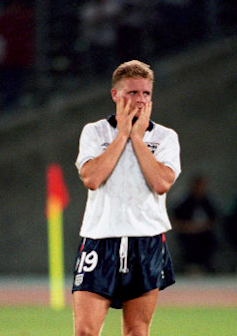How Emotional Intelligence Helped Take A Young England Team To The Brink Of A World Cup Final
“Another time for England”; a youthful group who “did their nation glad”; a director who grasped and comforted every one of his players a while later hailed a national legend who “joined the nation”. Indeed, even offers of petticoats – Gareth Southgate’s mark sideline look – experienced the rooftop. As English football fans dealt with the devastating annihilation on account of Croatia in the World Cup 2018 semi-finals, it was clear there had been a substantial move in the manner in which these youthful footballers and their director were gotten and depicted in the media.
Difference the reaction to England slamming out of its first since forever World Cup in 1950, when the Daily Mail reverberated mentalities towards male footballers that have kept on characterizing quite a bit of the present prominent games scope
One reason for our soccer eclipse in the World Cup stands out clearly – our men are too gentlemanly… In a street fight you don’t play a violin – you use it as a club.

England manager Gareth Southgate comforts Ashley Young after England’s semi-final defeat.PA, CC BY-SA
The disappointment, both all things considered and exclusively, was essentially down to an absence of “battle”: the capacity to defeat all obstructions, for example, better-arranged and better-prepared rivals. The players ought to have been less strategic, less passionate and less delicate in the event that they needed to win, was the message. They had, the Mail gave off an impression of being stating, been deficiently “masculine”.
Macho man versus new man
The picture of the original England player – the “Lion” – has for some time been saturated with characteristics that would now be related with “dangerous manliness”. The perfect Lion, the Roy of the Rovers figure, is a stoic, resistant battler who battles against the chances without faltering or addressing. He doesn’t gripe or vocalize his inward conflict. His passionate range is, fittingly, restricted to thunders: either energy or outrage.

A distressed Paul Gascoigne after England lost to Germany in the semi-last of the 1990 World Cup in Italy. Dad, CC BY-SA
The famous picture of Paul Gasgoine in tears at Italia 90 is somewhat so notable in light of the fact that, as Daniel Story notes in his great book recording Gazza in Italy, it is the special case to the run the show. Gascoigne aside, the perfect England player is a statue of solid upper-lip enthusiastic suppression.
This English football legend is one the country’s press has helped settle in the prominent creative ability. Football triumphs or disappointments are as yet united to the apparent level of “heart” that a group or player has illustrated. Any “colorfulness” in players’ conduct –, for example, mold sense, ways of managing money or haircuts – is as often as possible taunted.
The exemplary picture of a Jack the Lad England star – the chest-pounding, identification kissing legend who can down a half quart easily – is one that stands ponderously against many years of advancement in football and pop culture, as thoughts of the ordinary “man” have been progressively tested. For a really long time, driving voices in sports announcing have supported certain players who fitted the Lion generalization to the detriment of others, and in the process have mutilated the truth of present day male football.
World Cup 2018
It has taken the World Cup in Russia, helped by England’s startling movement in the competition, to see that lethal limitation of English football personality generally tested. Certain players – most prominently Harry Kane – seemingly still get more noteworthy levels of praise because of their closeness to the “Soul of ’66” generalization of a great England universal. Nonetheless, there has been an undoubted and welcome development in scope that communicates the enthusiastic education of the youthful players conveying the expectations of a country.
The constructive stages given to Danny Rose, for instance, to talk about his psychological well-being and fights with wretchedness, denotes a critical advance where footballers and individuals inside football culture can express enthusiastic and mental defenselessness. Where different players who experienced psychological sickness – most strikingly Paul Gascoine – progressed toward becoming things of newspaper titillation, the expanded affectability and acknowledgment of men’s emotional well-being is an appreciated advance and long late.
Changing media states of mind
Media portrayals of the squad have likewise tested customary thoughts of the dangerous Lion perfect by demonstrating these players as assorted and touchy young fellows. It is relatively unfathomable to envision past ages of English World Cup sides being indicated playing around on inflatable unicorns, for instance, without either an accentuation on liquor – admissible for instance of chap culture – or toe-twisting teases with homophobic “talk”. This age, in any case, is appeared to be just having some good times: communicating straightforward, virtuous happiness while as yet bearing an identification that truly would have demoralized any enthusiastic articulation.
In an ongoing appearance on BBC Radio 5 Live, the New York Times’ central soccer journalist Rory Smith briefly plot how the other incredible English football fantasy of the forceful, paralyzed administrator is not any more relevant in the cutting edge amusement. Being shouted and yelled at by a supervisor, as he put it, is “not how individuals in any industry hope to be dealt with”. The explanation behind this change in more extensive dispositions is likewise reflected in the UK media step by step breaking with its customary connection to the Lion-style footballer.
This “millennial group” (to get Smith’s words) is one that experienced childhood in a more extensive culture that undeniably observes male enthusiastic articulation and individual helplessness as an option that is other than a disappointment of character. Seeing these players communicating an assortment of feelings – from perkiness and love to delicate powerlessness – is an impression of a general public ending up more alright with male enthusiastic insight.
It’s an appreciated advance forward in British football culture when the picture of a player in tears is never again thought about a shame. Britain’s World Cup group are still Lions; yet now they’re permitted to accomplish more than basically thunder.



